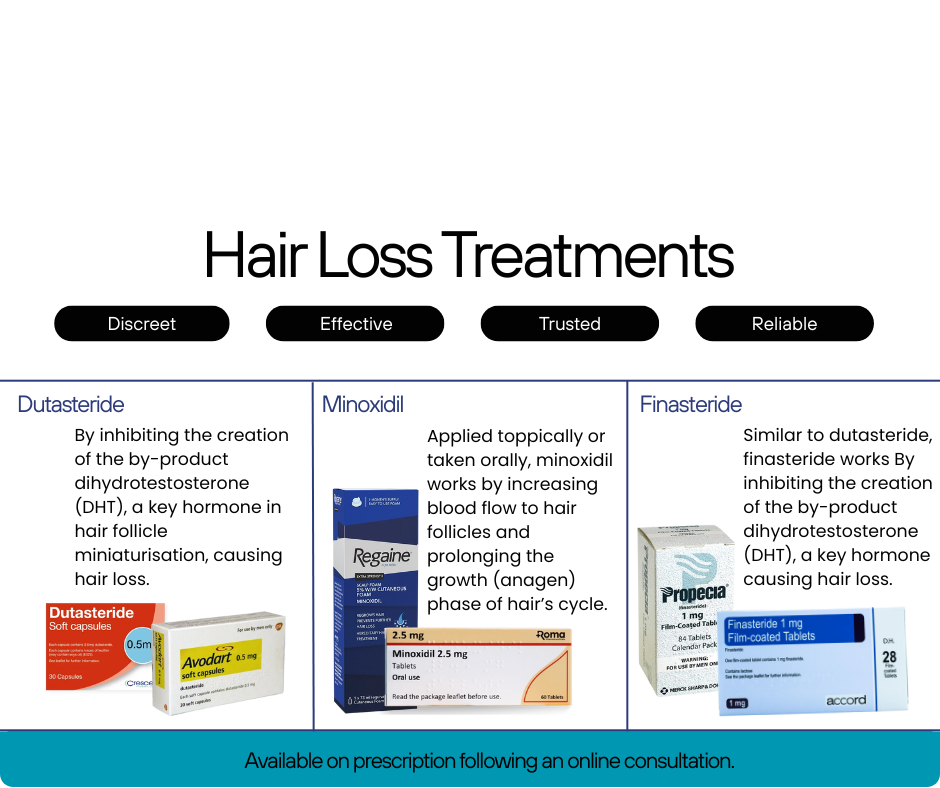Is There a Link Between Hair Loss and Male Fertility?
Hair loss can be a frustrating experience, especially when it starts earlier than expected. But beyond the cosmetic side of things, many men are starting to ask a deeper question: Could hair loss be connected to fertility?
While not every case of hair thinning signals a problem with reproductive health, there may be some overlap. Especially when it comes to hormones such as testosterone and its byproduct dihydrotestosterone (DHT). Understanding how these hormones work can help explain the possible connection between hair loss and fertility, and most importantly, how hair loss treatments fit into the picture.
Understanding Hair Loss in Men
Hair loss in men is incredibly common. The most common form is androgenetic alopecia, better known as male pattern baldness. This type of hair loss is largely driven by genetics and hormones, particularly dihydrotestosterone (DHT).
DHT is a derivative of testosterone that plays a large role in hair growth and hair loss. While during puberty DHT is responsible for the development of body hair, as well as other male characteristics, into adulthood too much DHT can cause hair follicles to shrink, leading to thinner strands and eventual hair loss. This process can start as early as your 20s and affects over 50% of men by age 50.
The Hormonal Connection
DHT and testosterone are closely linked, and both have an influence over more than just hair growth. Testosterone is essential for sperm production, libido, and overall reproductive health.
Because DHT is a derivative of testosterone, some researchers have explored the possible link between DHT and fertility also. The theory is that if your hormone levels are imbalanced enough to cause hair thinning, they may also be affecting sperm quality. However, the science isn’t quite confirmed.
While high DHT levels can affect hair follicles, it’s low testosterone which is linked to fertility issues. So, while hair loss and fertility might share some hormonal pathways, one doesn’t necessarily cause the other. Instead, both conditions may be the results of an underlying hormone imbalance.
What Does the Research Say?
Some studies have suggested a possible link between early-onset hair loss and lower sperm quality or count. Examples of a few small-scale clinical observations found that men with pattern baldness had slightly lower semen quality compared to men without hair loss; but no direct cause-and-effect relationship has been confirmed.
It’s important to note that hair loss on its own is not a direct indicator of infertility. Many men with male pattern baldness have no difficulty with fertility. That said, if you’re experiencing hair loss alongside symptoms such as low libido, fatigue, or difficulty conceiving, it may be worth looking into your hormone levels and reproductive health.
Can Hair Loss Treatments Affect Fertility?
This is an important consideration especially for men who are considering starting a family.
One of the most popular hair loss treatments, finasteride (brand name Propecia), works by lowering the DHT levels in the body. By reducing this DHT, finasteride can slow down shedding and even lead to regrowth in some men.
However, due to its hormone-altering activity, in a small number of cases, finasteride has been linked to changes in sperm count and quality. These effects are typically rare and reversible once the medication is stopped, finasteride is not recommended if you are actively trying to conceive as a precaution, and in fact, it’s best to stop treatment at least one month before trying to conceive.
If you’re planning to conceive in the near future, it’s always best to discuss other options with a healthcare professional.
Topical treatments such as minoxidil (brand name Regaine) are an excellent alternative if you are looking to conceive and yet still wanting to manage your hair health. Applied directly to the scalp, minoxidil does not affect hormone levels and so does not impact fertility. Minoxidil is a vasodilator. It widens blood vessels in the scalp. This increases blood flow. More oxygen, nutrients, and hormones can then reach the hair follicles. All the supporting factors in healthy hair growth.
The Bottom Line
While there’s no conclusive evidence that hair health is directly linked infertility, both issues can stem from similar hormonal imbalances; especially involving testosterone and DHT. If you’re losing hair early or rapidly, take note. Worried about fertility too? Talk to a healthcare provider. Taking care of your health, inside and out, is always the right step.








